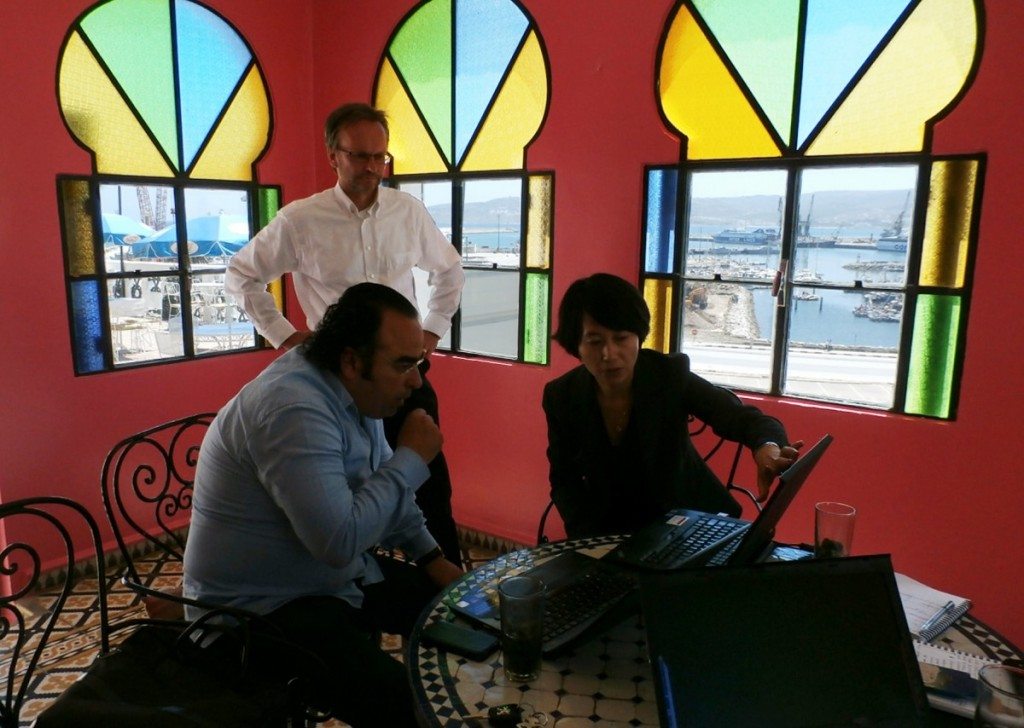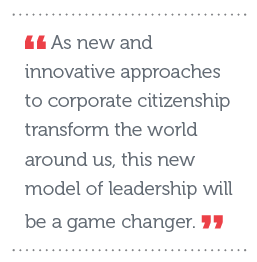Corporate citizenship and close cross-sector alignment is integral to the new model for leadership in a globally-integrated world, but what is “corporate citizenship” exactly? The turn-of-the-twentieth-century model of corporate philanthropy—taking first and giving back later—is obsolete. But the differences between the post-1960s model of corporate philanthropy and the future of what it means to lead in government, nonprofit organizations, and business are just as important. Today’s corporate citizenship agenda must incorporate a company’s core values and approach to doing business while also addressing three key goals:
- Solving the pressing problems faced by communities around the world,
- Developing the next generation of leadership, and
- Creating sustained business value by opening new markets and building capabilities.
The pursuit of these integrated goals guides IBM’s approach to citizenship while building strong cross-sector partnerships, reinforcing client relationships, deploying the company’s technology and top talent, and overcoming challenges of culture and geography. The new model for global leadership is a potent blend of citizen diplomacy, innovative partnerships, and cross-sector collaboration that delivers real and sustainable community and business value.
High Skills for Sustainable Change
In collaboration with public-sector, civil society, and private-sector partners, IBM Corporate Service Corps, known as CSC, has been pioneering an effective approach to global leadership.
In South Africa, CSC is working with Novartis and Vodacom to support the NGO Kheth’Impilo AIDS Free Living in their efforts to improve public sector health care capacity and fight HIV and diabetes across low-income communities.

IBM CSC participants collaborate while on assignment in Morocco.
In partnership with the Ghana Health Service and the Yale School of Medicine, a CSC team is working to support Ghana in its quest to become the first sub-Saharan country to eliminate the transfer of HIV from mother to child.
In May, a Corporate Service Corps team will partner with Becton Dickinson in Peru to bring efficiency to the early diagnosis, treatment and tracking of cervical cancer.
These are only three examples of how teams of IBM’s top talent have engaged in real problem solving in the early months of 2014 alone. Nearly 2,500 of IBM’s top talent from 55 countries have participated in more than 850 CSC engagements in more than 35 locations over the last five years. If billed at standard consulting industry rates, these efforts, which have addressed issues that include health care, education, and economic growth, would be valued at nearly $65 million. Yet, even more significant are the growth and transformation experienced by both clients and program participants on the ground.
Whether it is helping young technology entrepreneurs in Dakar, Senegal bring locally created tech solutions to market, advising the Indonesian Licensing Agency on efficiency improvements to help businesses start up quicker and contribute to local economic growth, or working to secure the futures of organizations providing vital services to thousands of women in Ukraine, Belarus and Moldova, IBM’s CSC contributes expertise that’s far more valuable than cash. Yet, this approach doesn’t only solve problems and create value. It also builds skills and capabilities that can contribute real and sustainable solutions to many of the world’s toughest challenges.
Leadership and Partnership
No single company or economic sector can address—let alone solve—all of the world’s critical problems. Solving them requires deep collaborations and partnerships among local, regional and national governments, nonprofit organizations, corporations and others who are committed to finding solutions and bringing them to scale, an innovative approach to corporate citizenship, extending to citizen diplomacy.
Through innovative projects that have focused on health and education, small business development, and government service delivery, IBM’s CSC has helped support economic growth, and social and community development in growth economies around the world. Critical to this impact are the partnerships that extend and intensify these engagements. Our partnership with USAID, the Center of Excellence for International Corporate Volunteerism, enables CSC consultants to be linked directly into ongoing USAID programs, ensures sustainability, and extends taxpayer dollars. Working with and through our implementing partners, Digital Opportunities Trust, Australian Business Volunteers, and PYXERA Global to support logistics and project development enables us to focus on providing the best service possible in target geographies.
At the recent Global Ties U.S. conference in Washington, D.C., I had the opportunity to share IBM’s perspective on corporate citizenship with ambassadors, private sector partners, and participants in the U.S. Department of State’s prestigious International Visitor Leadership Program. And in April, my team and I will meet with U.S. Congressional members and their staffs to discuss the complementary efforts that corporations and the federal government can undertake to advance our mutual agenda of global cooperation, economic development, and political stability.
![CSC-Leadership_Infographic_Final_crops[1]](../../wp-content/uploads/2014/03/CSC-Leadership_Infographic_Final_crops1-778x1024.jpg)
To serve that agenda, IBM Corporate Service Corps participants have helped to empower women in India by increasing access to health services. They have restructured lending practices to reduce loan default rates and improve financial training for small entrepreneurs and farmers in South Africa. In the program’s early years, one IBMer singlehandedly developed a cloud computing solution that would bring services to 20,000 children in Brazil. In Vietnam, IBMers supported a key tourism provider to achieve 600 percent growth in their contribution to the tourism industry. And in Nigeria, a CSC team collaborated with the Government of Ekiti State to improve the operational effectiveness of its educational institutions.

It is not just partnerships across the public, private, and social sectors that make these programs so powerful. Working with other companies with different areas of expertise has multiplied our ability to more deeply impact complex challenges. IBM has invited numerous clients to participate in our CSC teams. JPMorgan Chase & Co., John Deere, and FedEx are among those who have intermingled their expertise with IBM’s to help address complex societal issues. In May 2011—IBM’s Centennial year—four FedEx employees were part of a CSC/Brazil team that worked with a cultural institute in Bahia to increase education, economic opportunity, and political engagement among the state’s African Diaspora. Later that year, John Deere contributed expertise to our team in India to work with educators and farmers to improve IT operations in the agricultural supply chain. These leading corporations join IBM in understanding the importance of building relationships in new markets through collaboration and knowledge sharing—the essence of citizen diplomacy.
Return on the Human Capital Investment
Efforts from IBM and our clients are only the beginning of what is possible. While IBM selects 500 of its top talent to participate in CSC teams each year, imagine if all FORTUNE 500 companies contributed the expertise of only 20 percent of that number. In this new era of leadership—fueled by the global awareness, cultural sensitivity, and cross-sector collaboration of citizen diplomacy—thousands of teams of talented problem-solvers could address the world’s toughest challenges. As new and innovative approaches to corporate citizenship transform the world around us, this new model of leadership will be a game changer.
Stanley Litow
Stanley Litow is IBM’s Vice President of Corporate Citizenship & Corporate Affairs and President of IBM’s Foundation. Under his leadership, IBM has been widely regarded as the global leader in Corporate Citizenship, and praised for societal and environmental leadership, labor practices, and civic leadership. Mr. Litow helped devise IBM’s Corporate Service Corps, a corporate version of the Peace Corps, to train and deploy thousands of IBM’s future leaders.




Pingback: Service and the New Dimension of Leadership | Citizen IBM Blog